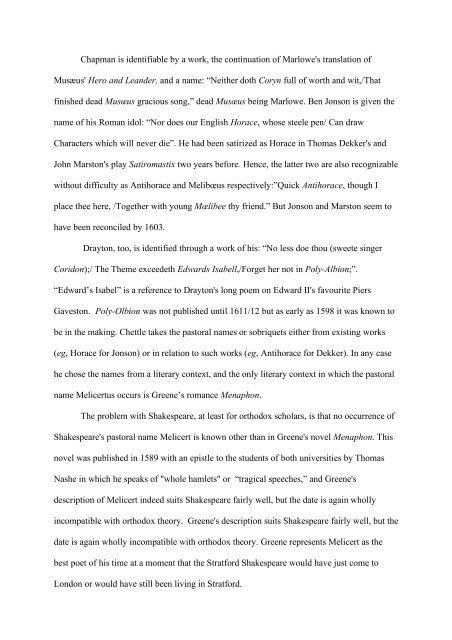Detobel's Collected Essays - Elizabethan Authors
Detobel's Collected Essays - Elizabethan Authors
Detobel's Collected Essays - Elizabethan Authors
You also want an ePaper? Increase the reach of your titles
YUMPU automatically turns print PDFs into web optimized ePapers that Google loves.
Chapman is identifiable by a work, the continuation of Marlowe's translation ofMusæus' Hero and Leander, and a name: “Neither doth Coryn full of worth and wit,/Thatfinished dead Musœus gracious song,” dead Musœus being Marlowe. Ben Jonson is given thename of his Roman idol: “Nor does our English Horace, whose steele pen/ Can drawCharacters which will never die”. He had been satirized as Horace in Thomas Dekker's andJohn Marston's play Satiromastix two years before. Hence, the latter two are also recognizablewithout difficulty as Antihorace and Melibœus respectively:”Quick Antihorace, though Iplace thee here, /Together with young Mœlibee thy friend.” But Jonson and Marston seem tohave been reconciled by 1603.Drayton, too, is identified through a work of his: “No less doe thou (sweete singerCoridon);/ The Theme exceedeth Edwards Isabell,/Forget her not in Poly-Albion;”.“Edward’s Isabel” is a reference to Drayton's long poem on Edward II's favourite PiersGaveston. Poly-Olbion was not published until 1611/12 but as early as 1598 it was known tobe in the making. Chettle takes the pastoral names or sobriquets either from existing works(eg, Horace for Jonson) or in relation to such works (eg, Antihorace for Dekker). In any casehe chose the names from a literary context, and the only literary context in which the pastoralname Melicertus occurs is Greene’s romance Menaphon.The problem with Shakespeare, at least for orthodox scholars, is that no occurrence ofShakespeare's pastoral name Melicert is known other than in Greene's novel Menaphon. Thisnovel was published in 1589 with an epistle to the students of both universities by ThomasNashe in which he speaks of "whole hamlets" or “tragical speeches,” and Greene'sdescription of Melicert indeed suits Shakespeare fairly well, but the date is again whollyincompatible with orthodox theory. Greene's description suits Shakespeare fairly well, but thedate is again wholly incompatible with orthodox theory. Greene represents Melicert as thebest poet of his time at a moment that the Stratford Shakespeare would have just come toLondon or would have still been living in Stratford.


